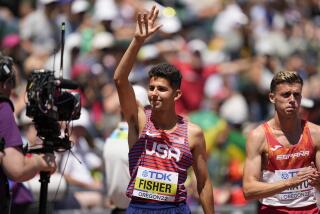Marathon Man, Medicine Man : Distance running: Because of medical career, Kempainen is near the finish of his competitive athletic career.
- Share via
The finish line is in view. Three more marathons, if all goes well, and Bob Kempainen retires from the sport, perhaps prematurely at 30, but for the best of reasons.
Los Angeles on Sunday, the Olympic trials in February in Charlotte, N.C., and the ’96 Games in Atlanta--and that’s it. He wants to be Bob Kempainen, M.D., and four years of medical school in six years that have been broken by periods of training and competing have been tough enough.
Three years of residency without complete concentration? Forget it.
“I look at this as a crossroads for me,” he said. “I wouldn’t want to be wearing both hats, like I am now. That would be kind of hard.
“Fortunately, I’m kind of excited about getting on with school. I like it. The grinding hours, I get pretty excited about it. You could make a career out of running, but I guess I really don’t like it enough.”
Not that he hasn’t been good at it.
Kempainen ran the 1994 Boston Marathon in 2 hours 8 minutes 47 seconds, and no American has run 26 miles 385 yards faster.
He ran on the 1992 U.S. Olympic team, finishing 17th on a hot afternoon in Barcelona in 2:15:59 as a 10,000-meter specialist stretching out his run.
The discipline and concentration that allowed him to pursue an education in medicine while running in the fastest lane have made him a world-class marathoner. Those qualities also allow him to say he can walk away, that five years in the sport are enough, and mean it.
After delivering six babies, saving the life of a man who tried to kill himself with a drug overdose and treating cases of hepatitis, running just doesn’t seem that important.
Still, it has its place and time. The place is Los Angeles and the time is Sunday.
Kempainen came to marathon running as a way to make the Olympic team. He had competed in the 10,000-meter trials in 1988, making the finals, but sensed he could run better if he ran longer.
“He has a tremendous sense of pace,” said Vin Lannana, Stanford’s track coach and Kempainen’s mentor since their days at Dartmouth in the 1980s, when Lannana was coach and Kempainen a cross-country runner.
“His sense of pace--running the 400 in a certain time, the 800--allows him to focus on the marathon.
“He was a good 10K runner--is a good 10K runner--but he felt his cap would be at a longer distance. We tried a marathon, to see how he liked it, and he kind of evolved from there.”
The race was the 1991 Twin Cities Marathon, run in Minneapolis, his hometown, and Kempainen finished second in 2:12:12, two seconds behind Malcolm Norwood of Australia. A marathoner was born.
Make that a part-time marathoner. Also a part-time medical student at the University of Minnesota after a year spent working in a laboratory. And a part-time volunteer worker in clinics. And an occasional doctor’s shadow.
It’s what separates him from the professional runners, to whom every hour of every day is invested physically or mentally in the next race.
“I’m used to being busy,” Kempainen said. “I’m not one of those people who thrives on 100-hour work weeks, but I try to keep something else going on besides running. I try to keep my hand into medicine things so I don’t feel like I’m totally losing touch.”
You have to wonder how good he could be if he immersed himself in the sport, rather than living a life split between athletics and academia. Sunday, he will compete with Arturo Barrios, whose personal best--his run in Boston as a Mexican citizen five months before he was granted U.S. citizenship--is 19 seconds faster than Kempainen’s. Barrios is a full-time runner. So are the Kenyans and the Mexicans, considered the world’s best.
Medicine and running, is it all too much?
“Not for Bob,” Lannana said. “Not with his work habits and personality. He has the ability to concentrate on the thing he is doing at the moment. Some might not be able to run as well the way he does things, but I think it allows him to run better. He’s always trying things for self-improvement. He wants to be the best doctor, the best runner, the most well-read person. His way works for him.”
It sure keeps him from being bored.
“I think I’m better off that way,” Kempainen said. “I don’t know if it’s the lack of focus or what, but the idea of just having two runs that day and then having Oprah staring at you on the television--well, don’t pick on Oprah because she’s a runner now--to have nothing else, well I guess I have too much ‘antsiness’ for that. I get pretty restless.
“Besides, marathoners, it seems for the most part, don’t stay at their top level of performance for long periods. It seems like they come and go. I don’t know if that’s because they race too much, or because they’re so focused on it that they get mentally fried.”
When he gets restless, Kempainen alters his training and fills his time by volunteering for clinic work in San Francisco. He has just come west from Ft. Collins, Colo., where he tried running at altitude to build endurance. He has tried Nordic Track because he used to be a skier in Minnesota and it looked like a good idea. He has run in water.
He will leave Los Angeles after running Sunday, go to Denver and pick up his car, then drive back to Minnesota. Four weeks of cardiology await, then four weeks of emergency-room study. The occasional workout and a 10,000-meter track season, with races sought for May, June and July will help build speed and keep him competitive.
More school, with workouts whenever time allows until mid-October, and then hard workouts toward the Olympic trials.
More school, with graduation in June of 1996, then, if all goes well, Atlanta, two months after that. And then it will be strictly Dr. Kempainen, perhaps specializing in internal medicine, perhaps not, but definitely not in sports or orthopedic medicine.
“It just doesn’t appeal to me,” he said simply.
But for now. . . .
“I’m still running to see how good I can be,” he said. “Maybe if I kept going for another four years or five years after that, until I’m 34 or 35, I still might have some good (races). But by and large, people have already had their best race by the time they’re 35. To start running slower while you’re still working is pretty hard. I don’t know if I could get excited about that.
“I’m just glad I have something ahead of me.”
Two things, actually. A finish line. And then a beginning.
More to Read
Go beyond the scoreboard
Get the latest on L.A.'s teams in the daily Sports Report newsletter.
You may occasionally receive promotional content from the Los Angeles Times.






